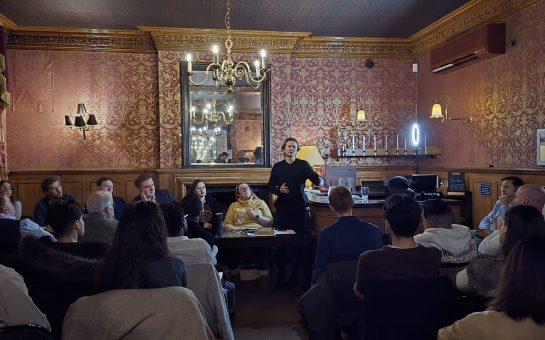“I was on my own and I was just crying my eyes out. It was like my whole life was over,” Sarah Sparkes recalled.
After more than five years of tests, visits to her GP and various specialists, the cause of her agonising pain was finally diagnosed as endometriosis in the midst of lockdown.
But this diagnosis came with the heart-breaking decision: have complex surgery or face being paralysed.
Sparkes, 44, was healthy and active when she started experiencing pain in her right hip and leg.
The keen runner was left struggling to walk as her condition worsened and she developed foot drop.
After being diagnosed with an uncommon form of endometriosis called sciatic endometriosis, she was advised to have surgery without which she would have to use crutches or a wheelchair.
Sparkes said: “It was very petrifying. I’ve never had anything wrong with me and I was faced with this massive operation where it’s really risky.
“Being so healthy and active, it sounds so cliché, but you think it’s never going to happen to me.
“It’s such a shock to suddenly be faced with a long-term disability.”
Endometriosis is a chronic condition in which cells similar to those which line the womb, the endometrium, are found elsewhere in the body.
These cells behave in the same way as the endometrium: building up, breaking down and bleeding.
However, unlike the endometrium this blood has no way to leave the body and can result in ‘chocolate’ cysts, pain and scar tissue.
Symptoms of endometriosis typically include pelvic pain, debilitating period pain and pain during or after sex.
The administration worker from south east London underwent a preventative complex key-hole operation in June, at the Lister Hospital Endometriosis Centre, Chelsea, to excise the disease.
Shaheen Khazali, the endometriosis surgeon and neuropelveology expert who led the team that operated on Sparkes, explained that she suffered from an uncommon form of endometriosis where the disease invaded pelvic nerves.
Khazali, who is also a consultant gynaecologist at Ashford & St. Peter’s Endometriosis Centre in Surrey, added: “Fortunately, in most cases, endometriosis is not advanced but in Sarah’s case the disease was inside the lumbosacral trunk and superior gluteal nerve.
“In addition to causing pain, this had led the complete inability to lift her right foot.”
Sparkes’ nerve damage means that she now wears a foot brace to support her walking and build up strength, something which has affected her confidence.
Symptoms of endometriosis typically include pelvic pain, debilitating period pain and pain during or after sex.
Alongside recording the physical impact, an inquiry by the All-Party Parliamentary Group on Endometriosis, released in October, demonstrated how endometriosis can affect all aspects of life.
Just over 80%of the 10,000 surveyed said that endometriosis had negatively, or very negatively, impacted their mental health.
“I’m just trying to come to terms with it all. It’s not just the pain I had; I now have a physical disability,” Sparkes explained.
“Sometimes I think I’m so unlucky – what have I done to deserve this? It is quite hard to deal with.
“I feel like I’ve lost something.”
The condition affects one in ten women, yet the average time for an endometriosis diagnosis in the UK is eight years.
This delay is something that Khazali believes is unacceptable. However, he is optimistic about the future.
He said: “I think a lot has improved over the last few years. Doctors are better trained and women are much better informed.”
Faye Farthing from Endometriosis UK agreed: “Endometriosis can have a huge impact on a person’s physical and mental health – and it’s vital that those with the disease get access to the right support at the right time.”
Nearly 60% of women surveyed by the APPG had visited their GP over ten times, while 46% found their GPs to be unhelpful or very unhelpful.
Sparkes revealed how, despite suffering from painful periods for over a decade, her GP refused to refer her to a gynaecologist when an ultrasound scan showed no abnormalities.
A normal ultrasound scan does not rule out the presence of endometriosis, which is often not picked up.
A breakthrough in Sparkes’ road to diagnosis came two years ago when an MRI scan on her hip revealed muscle wastage in her gluteus minimus and medius.
However, this nearly didn’t happen after a physiotherapist dismissed Sparkes’ plea for the scan and insisted she only needed one on her back.
“If I hadn’t had pushed for that I don’t know where I’d be because she was quite adamant that she wasn’t going to do it,” Sparkes said.
Subsequent tests revealed severe nerve damage in her glutes and a mass in her pelvis.
After two biopsies earlier this year to rule out the possibility of cancer, endometriosis was confirmed.
“I had the pain for about five years so to suddenly get a diagnosis was such a relief,” Sparke said.
In what is believed to be one of the first operations of its kind in the UK, Khazali worked alongside a multi-disciplinary team, including a neurosurgeon, Marco Sinisi, and a colorectal surgeon, Philip Bearn, to remove endometriosis from Sparke’s pelvic nerves and other organs.
“Exciting developments happen when specialists from different areas of medicine start working together and that’s where magic happens,” he said.
Sparkes does still have her foot drop which could take up to two years to recover, if at all.
However, her pain has been much better since her operation and she says she is very grateful to Khazali and his team.
“I feel very fortunate to have been able to have the operation in lockdown and to have found Mr Khazali who was able to carry out this complex operation,” she said.
“From finding myself in a very lonely scary place they gave me the hope and have given me the ability to move on with my life and I am forever grateful.
“I do get some pain, I’m not pain free, but I’m reassured that the endometriosis is no longer continuing to damage that nerve.”





Join the discussion
I have Peripheral Neuropathy which leaves both legs from the knees down with no feeling and foot drop in both legs; is it possible that this is caused by Endometriosis ?